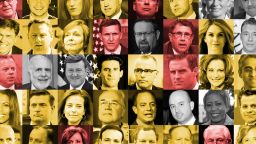President Donald Trump was already far behind in staffing his administration, and then he fired his secretary of state.
In tapping his CIA director, Mike Pompeo, to replace outgoing Secretary of State Rex Tillerson, Trump set up two fresh confirmation battles to restaff his Cabinet – when experts say he still hasn’t gotten through his first wave.
At the end of his first year in office, Trump lagged far behind his most recent predecessors in both nominations and confirmations. He trailed President Barack Obama by more than 150 nominations and confirmations, and President George W. Bush by nearly 250 nominations and 200 confirmations.

Acting officials are rife throughout government, as career officials serve temporarily in top positions.
Trump has said he is leaving positions open in an effort to cut government, but experts say that is misguided, as the positions are filled instead by acting staff who are not in a position to change policy. He’s also blamed Democrats – the minority party in the Senate – charging they’ve dragged their feet on his nominations.
Now, with plenty of key high-level posts still awaiting confirmed nominees, Trump is already dealing with departures, some of his own making, which will only add to the backlog of vetting and getting nominees through Senate confirmation in an election year. Experts say it’s precisely why they recommend that presidents nominate and confirm as many appointees as possible by their first August congressional recess.
“Rex Tillerson is a great American and I’m sorry to see him go,” the Senate’s No. 2 Republican, John Cornyn of Texas, said Tuesday. “With everything else we have to do around here, having the prospect of two additional confirmation fights perhaps is going to be a challenge.”
Max Stier, president of the nonprofit good-governance organization the Partnership for Public Service, warns that with this pace of nominations and confirmations, and the potential of a Congress controlled by an opposition party after the midterm elections, it could become even more difficult for the administration to recruit top talent.
“The administration was already the slowest that we have records for and by a substantial margin, so this is adding to the woes and it’s not the right direction to be going in,” Stier said.
The departures have been particularly pronounced in recent weeks – especially with a focus on how many White House staff have had trouble getting permanent security clearances.
In the last two weeks, five top administration officials have been fired or resigned: Tillerson, National Economic Council chief Gary Cohn, communications director Hope Hicks, Trump personal aide John McEntee and communications aide Josh Raffel. While all of those but Tillerson’s are not Senate-confirmed positions, vetting their replacements could still take time and resources. As of last week, 35 senior officials had left the administration thus far, before McEntee and Tillerson on Tuesday.
Calling the staffing situation a “big mess,” Stier said the move by Trump to pull from within his administration – as he did to replace former Homeland Security Secretary John Kelly in his move to White House chief of staff with Kelly’s chief of staff, Kirstjen Nielsen – is typically something seen at the end of administrations – not almost the beginning.
“You’re playing a zero-sum game, you’re not adding to your talent mix and you’re also not expanding your horizon of the talents and skills you need in the administration,” Stier said of a game of “musical chairs” he said Trump is playing. “That typically does happen, but not usually until way later into an administration.”
And Stier said finding the people and getting them in their positions is only the first few steps. Once in the job, they’ll need to bring in teams and get up to speed.
“Filling these jobs is just stage one: You need to on-board these people, they have to learn their jobs and they have to work as a team. … So this is very damaging for the ability of government to operate effectively and to fundamentally deal with crises that are inevitably going to pop up,” he said.
CNN’s Sunlen Serfaty and Dan Merica contributed to this report.




